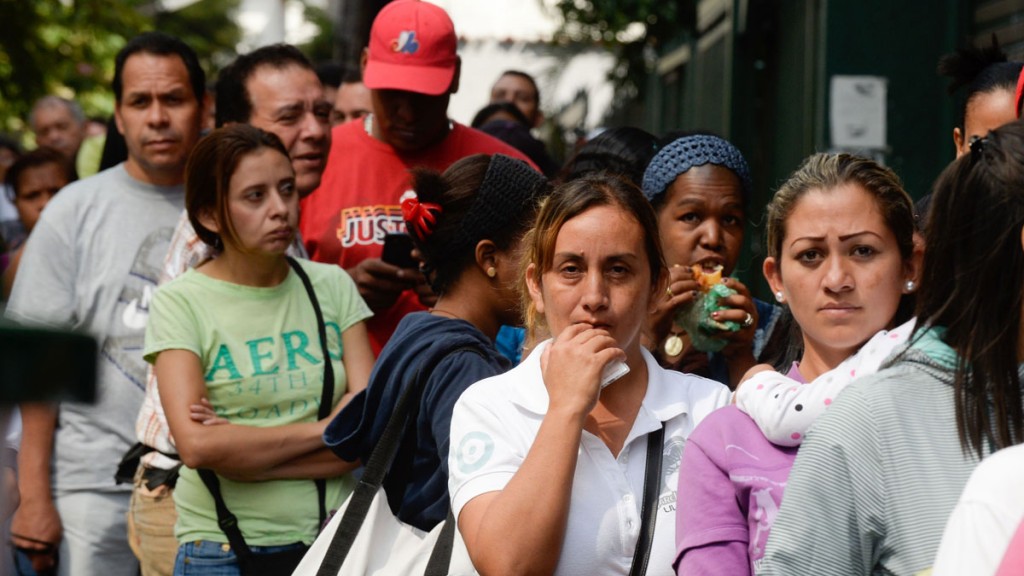
The falling oil price has exposed the Chavista revolution for what it was – a vainglorious spending splurge. The result now is suffering and chaos, says Simon Wilson.
How bad are things in Venezuela?
Terrible – and only getting worse. Venezuela has the world’s biggest proven oil reserves. Yet the country – on the northern coast of South America, to the east of Colombia – is in the grip of political paralysis, catastrophic “hyperinflation” and the world’s biggest current economic contraction: it shrank by 10% last year, according to International Monetary Fund (IMF) estimates, and will shrink by about the same this year.
Even on Venezuela’s own official figures (which have been in short supply in recent years), the government has conceded that prices rose by 141.5% in the year to September 2015.
The IMF reckons inflation last year was 275%, and expects it to hit 720% this year, while the collapse in the currency – as measured by the black market exchange rate of around 1,200 bolivars to the US dollar, rather than the official rate of ten – suggests the current inflation rate is around 380%.
How are people coping?
Many are not. Three-quarters of the population live below the poverty line, reports Caracas-based economist Orlando Ochoa. Of these, more than half are in “extreme poverty”, meaning they don’t have enough money to buy food. Real wages fell by 35% last year. Violent crime – including murder – is surging, in a country that already had one of the world’s highest homicide rates.
Imports have crashed, shops lack even basic staples, and queues to buy what little there is are the norm. “There is a shortage of everything,” says Russ Dallen of specialist investment bank Latinvest, who warns that Venezuela could become a “Somalia-like” failed state.
“It was just toilet paper at the beginning, but that was when oil was $100”, compared to an average of $27 a barrel for Venezuelan crude this year (on Latinvest figures). “The worst shortage is of medicine and medical equipment. To be sick in Venezuela right now is a death sentence.”
Is this all about oil?
No, it’s been brewing for years. Under the late Hugo Chávez (president from 1999-2013), Venezuela used its oil tax windfall to underwrite what the charismatic leftist called a “Bolivarian revolution” – a mix of state socialism and “anti-imperialist” nationalism that involved state subsidies for basic goods (particularly petrol), price and exchange controls, state expropriations of private firms, and plenty of rhetoric on the evils of capitalism.
Since his death, two key things have happened. The oil crash has exposed the “revolution” for what it was: a vainglorious spending splurge that would inevitably end in disaster. All oil producers have suffered, but “Venezuela is almost alone in having made no provision for lower prices”, says The Economist.
And the second?
Chávez’s chosen heir as president, Nicolás Maduro, has proved inept at keeping the “chavista” show on the road. He has clung on to power, so far, by fiddling elections, gerrymandering the constitution and subverting the supreme court to his ends.
But in doing so he has made the country’s already-toxic politics – Maduro’s opponents are denounced as US spies; some have been jailed; the economic woes are blamed on “fascist” saboteurs and so on – even more combustible. “We are at risk of civil war if we cannot find an exit from the crisis,” says Henri Falcón, a state governor and former Chávez ally who broke with the ruling Socialists in 2012.
What caused this “hyperinflation”?
Just as there is no universal definition of what counts as “hyperinflation” (though many economists follow Phillip Cagan in defining it as persistent price rises of more than 50% a month), there is no universally accepted explanation of what its cause is. The standard explanation is that hyperinflation is triggered by governments printing too much money to finance their debts.
But real-world examples of hyperinflation – Weimar 1922-1923, Bolivia in the 1980s, Yugoslavia in the 1990s, Zimbabwe in the 2000s – suggest that hyperinflation is not purely a monetary phenomenon, but is associated with a range of economic, political and social factors.
Such as?
Hyperinflation occurs when populations experience such a loss of confidence in the currency that they no longer trust it as a store of value – this is often associated with big external shocks, such as war. People seek to spend money as soon as they have it, pushing prices ever higher, together with wage demands, in a vicious spiral.
In the case of Venezuela, the hyperinflationary episode is closely associated with the collapse in oil prices and the slide into political chaos. It has got so bad, reported Bloomberg last week, that the government no longer has enough money to pay for its money: foreign banknote manufacturers are reporting delays in payment so severe that they are turning down further business.
All of which means that unless Venezuela’s political impasse can be unblocked – with some form of negotiated transition to a government of national unity, for example – it seems highly likely that it is looking at a dis